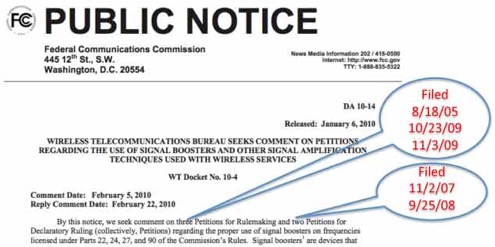How About Some Transparency in the Handling of Petitions?

The right to petition the federal government is one guaranteed by the 1st Amendment and the APA (5 U.S.C. 553(e)). FCC has implemented this requirement with 47 C.F.R. 1.401. But all this means nothing if petitions fall into an administrative black hole where they can not be seen, let alone acted on!
The top of this post is a January 2010 FCC public notice (PN) asking for comment on 3 petitions for rulemaking and 2 petitions for declaratory rulings. As the annotations in red indicate, the oldest petition involved was almost 5 years old when the PN was released. (As can be seen in the dates above, all these petitions arrive prior to the current Chairman. This is a longstanding problem going back more than a decade.)
I did some discreet inquiries after this PN was issued and was surprised to find out that 8th Floor staffers do not have routine access to lists of petitions that have been filed or even petitions that are siting with action x months after filing. It as not even clear if the Chairman’s Office has routine access to this information. Petitions apparently go to bureaus and offices and just sit around until someone decides to act on them - or not. One always has the options of going to the District Court and asking for a writ of mandamus, but that is possibly the only option. Since the existence of these petitions can be secret, it is difficult for interested 3rd parties to find out about them and try to pressure/embarrass the Commission into acting.
Some modest suggestions:
1. The Commission create an internal tracking systems for such petitions and report all filings to all commissioners within a month of filing.
2. The Commission create a public tracking system, analogous to the FCC Items on Circulation webpage, that documents all petitions more than 3 months old that have not been acted on and makes the text available for public inspection. This need not be a PN requesting comment, just an acknowledgement that the petition has been filed and is under review.
"The FCC should be a model of openness, transparency, and a fair, data-driven process."
Julius Genachowski's confirmation hearing for FCC chairman before the Senate Science, Commerce, and Transportation Committee
(Emphasis added)
blog comments powered by Disqus




![Validate my RSS feed [Valid RSS]](valid-rss-rogers.png)

